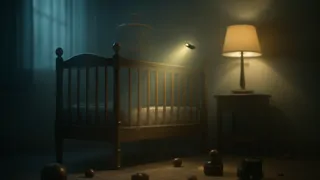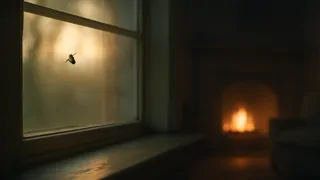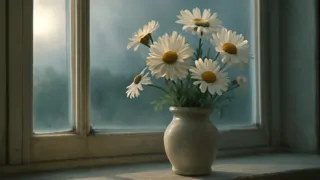Introduction
John Harper clutched the chipped wooden rail of his son’s nursery cot, fingertips grazing splinters that felt harsher under the weight of loss. The pale morning light filtered through gauzy curtains, casting soft patterns on the scuffed wooden floor, yet nothing could soften the raw ache in his chest. A hush hung in the air, denser than any silence he had known, pressing against his lungs until each breath felt like an impossibility. The faint hum of a lone fly caught his attention—a gentle, persistent reminder that life stirred even in this space of grief. It danced above a faded stuffed rabbit, looping around the corner where his son once reached out with a chubby hand. John’s vision blurred as memories of laughter, soft bedtime lullabies, and whispered hopes for tomorrow flooded back. He exhaled a shuddering breath and leaned closer, voice barely a whisper, speaking a name he feared he had forgotten. Yet here in the cool hush of morning, the small fly seemed to cling to hope with every fragile wingbeat. Outside, rain tapped against the windowpane, echoing the tears he dared not shed here. With a trembling hand, John reached out, tracing the insect’s flight, and allowed himself, for the first time since the funeral, to believe that love might yet carry them both toward dawn.
Echoes in the Nursery
As twilight settled over the Harper cottage, John Harper eased the door open and inhaled the familiar mingling scents of pine floor polish and lavender baby lotion. The pale glow of a single bedside lamp cast long shadows across every carefully arranged toy and tattered stuffed bear, lending a ghostly hush to the room that only loss can conjure. He stepped forward, each footfall tentative, as if the weight of invisible footsteps might snap a fragile thread holding his gratitude and grief in balance. On a low shelf, a row of tiny wooden blocks spelled out his son’s name: W-I-L-L-I-A-M, though one block had toppled, its ‘L’ rolling onto the carpet like a stray promise. John’s chest tightened as he knelt beside the cot, gingerly brushing his fingers over the soft quilt that bore invisible imprints of small hands and hopeful midnight hauls. He remembered William’s laughter, bright and curious, echoing off these painted walls as finger paintings dried by the window. Now, only the faint hum of the fly broke the stillness—a rhythmic pulse in the air. He watched the insect land on a sun-warmed patch of rug, its tiny legs trembling, and felt an unbidden swell of longing. Each loop of its flight seemed a testament to persistence, to a will that refused to rest even when the world had gone silent.

Memories of sunlit mornings on the village green haunted him in equal measure, as if each moment of joy were a blade that cut sharper in its absence. He could still see William’s bright brown eyes dancing with delight the first time he chased bubbles drifting above the grass, stumbling forward on unsteady legs while John’s laughter rolled across the dew-laden lawn. On days when the sky lay clear and blue, father and son would wander along the hedgerow, collecting gossamer strands of spider silk and marveling at the industrious ants forging tunnels beneath his fingers. John’s heart ached with the weight of all those unseen joys—the scraped knees he once kissed better, the bedtime stories read by lantern glow, the soft rustle of leaves whispering lullabies. Yet in this room, the fly’s quiet symphony offered a fragile promise that the world still turned, that nature’s cadence persisted beyond human sorrow. Each time it returned to the windowsill or circled the worn rocker, John felt a subtle tug at his chest, a reminder that even in mourning, there might be movement, a delicate rhythm that could guide him toward acceptance. He traced the path of its flight as if following a secret map, eyes brimming with unshed tears and a budding flicker of wonder. The nursery, once a shrine to what was lost, began to feel like a gateway to what could still be found.
Each evening, John found himself drawn back to the cottage’s mossy threshold, where the rolling hills of Somerset stretched out beneath a bruised sky. The rain-swollen fields glistened in the waning light, a tapestry of emerald and slate that whispered of seasons beyond sorrow. He recalled William’s small boots pattering across these meadows, voice high with excitement at the sight of stone walls cradling hidden wildflowers. In his mind’s eye, he reached out to steady a tiny shoulder wobbling on soft grass, encouraging each courageous step toward marvels unseen. But when the day had ended in tragedy, the same hills had become silent witnesses to his broken heart. Now, the solitary fly seemed to mirror his own tentative reemergence—a solitary wanderer navigating an uncertain terrain. As it settled upon a tuft of grass by the window ledge, John imagined it listening to the distant bleat of sheep and the slow drip of water from the eaves. Each subtle motion felt like a conversation that only a shattered father could decipher: an invitation to remember that everywhere, life rearranged itself in cycles of loss and renewal. He closed his eyes and let the damp breeze carry whispers of hope through the open casement, letting his mind drift to the day he might speak his son’s name without flinching. In that suspended instant between past and promise, he sensed the fragile beginnings of forgiveness stirring in his soul.
In the dim lamp’s glow, John understood that the fly was more than an intruder in silence—it was a flicker of resilience that had slipped through grief’s tight grasp. He pressed his palm against the cool glass of the window, feeling an echo of warmth in the insect’s restless wings. Tonight, he would light the lantern, play William’s favorite lullaby, and watch the shadows dance on the walls once more. The path ahead remained uncertain, but for the first time in weeks, he felt a steady pulse beneath his ribs, guiding him toward dawn and the promise of morning light.
The Fly at Dusk
Each night as dusk set in, the Harper cottage hummed with quiet ritual. John moved from room to room, lighting candles and closing heavy curtains, as though sealing away a world that had become too sharp in its absence. In the living room, he paused before a low wooden table, the grain worn by years of family meals and laughter, and noticed the small fly perched on a stray ribbon William had dropped. Its wings shimmered in the flame’s glow, steady and undaunted, while his own breath caught in his throat. He watched it settle on the ribbon’s edge, a fragile bridge between past and present, before it drifted toward the hearth. The moment echoed the simple trust William had shown when leaning against him for comfort, small fingers gripping at his shirt. In that flickering light, John felt a shy glimmer of tenderness, a memory half-forgotten yet still warm beneath the ache. He allowed himself to stay rooted there, letting the mundane scene carry the weight of love and loss in equal measure.

The next evening, he found himself drawn outside where the garden paths wound through roses and foxgloves now in late bloom. A gentle breeze carried the scent of damp earth and wild thyme as he followed the fly’s flight among the blossoms. It dipped near a cluster of forget-me-nots, their delicate petals nodding under the weight of droplets from an earlier shower. Here, John remembered the day he had shown William how to press a flower between pages of a book, preserving a moment of beauty for years to come. Now, amidst petals and dew, the insect’s journey felt like a message: that remembrance could be both somber and sacred. He knelt beside the flower bed, brushing his fingertips across damp leaves, and felt a tender pulse of life beneath his palm, echoing hope through every stem.
On the third dusk, John dressed in his old tweed coat and carried a single white rose to the small memorial bench at the edge of the wood. The evening sky bled into purples and deep blues as the fly alighted on the rose’s fragile tip, its legs barely stirring the soft petals. For a moment, father and son’s spirits seemed to meet in hush between petals and wingbeat. John laid down the rose, whispered William’s name, and watched the fly lift into that velvet sky. In the stillness that followed, he felt the weight of sorrow shift—not gone, but reshaped by love that even death could not silence. Under the gathering twilight, he took a steadying breath and rose to walk home, guided by a remnant of light carried on tiny wings.
Flight to Forgiveness
The following morning, John lingered in the dew-bright garden before sunrise, tracing the fly’s path among curling tendrils of honeysuckle. He recalled teaching William how to count dawn’s first birdsong, each note a promise of new beginnings. Now, as he watched the insect alight on a fragile bloom, he felt the ache of absence transform into quiet gratitude for every shared breath. The pale sky spread above him like a promise, and the fly’s wingbeat resonated as a soft reminder that life endures in cycles of dawn and dusk.

Later, he filled the old ceramic vase with water from the well and carried it indoors, placing it gently on the mantel beside William’s framed photograph. The fly followed, circling the vase’s rim before landing on a cluster of fresh daisies—a flower his son once planted by the window. John ran his palm along the vase’s cool surface, closing his eyes to let sorrow ebb and flow like tide against the shore. He sensed a stirring in his chest, a fragile pulse that spoke of healing and of love’s persistence.
By afternoon, he retrieved a piece of chalk and stepped into his son’s former bedroom, kneeling before the wooden block that bore the letter “L.” With trembling fingers, he placed a new handprint in white dust upon the wall, symbolizing both memory and release. A gentle hum drew his gaze upward to the corner, where the fly hovered in perfect stillness. In that moment, grief and forgiveness converged in a single breath, as though son and father might meet again on wings of light. John exhaled, feeling the ache soften and the room’s silence become a cradle for hope.
Conclusion
In the hush that followed these small rituals, John Harper realized that the bond he shared with William had taken on new forms—echoed in petal breaths, wingbeats, and the steady glow of dawn. The empty cot remained a place of memory, but it no longer felt like a tomb. Instead, it stood as a testament to love’s ability to transform sorrow into quiet purpose. Each time the familiar hum of a fly drifted through the cottage, he welcomed it as a reminder that healing could arrive on the gentlest breeze. Grief would always be a companion, but it no longer ruled the rhythms of his days. In its place rose a fragile grace, built on the simplest echoes of a son’s laughter and the tiny wings of hope.


















